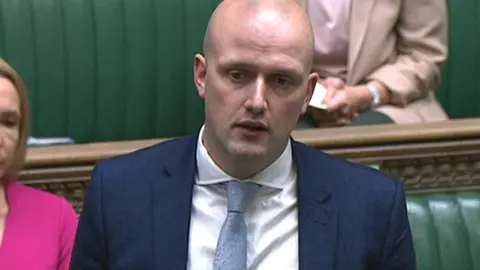SNP to announce new leader within six weeks
The new SNP leader will be announced on Monday 27 March, the party's national executive has announced.
Nominations for the post have already opened and will close at noon on Friday 24 February.
It comes a day after Nicola Sturgeon announced that she would step down after more than eight years as Scotland's first minister.
A party conference scheduled for 19 March to discuss a strategy to gain independence has also been postponed.
With no obvious successor, the party's first leadership contest in nearly 20 years could see a debate on future direction and strategy.
Possible replacements include:
- Kate Forbes, finance secretary who underwent a meteoric rise in recent years. Currently on maternity leave
- Angus Robertson, who previously headed the SNP's Westminster group and was a vocal critic of Theresa May's government following the 2015 election
- Humza Yousaf, health secretary who has held several senior posts in government. Part of a new generation of SNP figures
- Keith Brown, justice secretary seen as an outsider bet.
Deputy First Minster John Swinney, SNP Westminster leader Stephen Flynn and MP Joanna Cherry have ruled themselves out of the race.
The final ballot will be open from 13 March until 27 March.
The SNP's national executive said should there be more than one nominee, the new leader would be selected on a one-member-one-vote basis.
 PA Media
PA MediaThe party's national secretary, Lorna Finn, said: "Nicola has been the outstanding politician of this generation. We are very fortunate that she will remain an SNP MSP and a leading campaigner for an independent Scotland.
"But the SNP is full of talented individuals - and they now have the opportunity to put themselves forward and our new leader will lead us into the final phase of Scotland's journey towards independence."
Ms Sturgeon had backed the use of the next general election as a de facto referendum on Scottish independence.
Party members were due to decide on their strategy at a specially-convened conference in Edinburgh in March, but that has now been put on hold.
Lorna Finn said: "It would be wrong to have a newly elected leader tied to a key decision on how we deliver democracy in Scotland in the face of continued Westminster intransigence."
SNP MP Kirsten Oswald has described the timetable for electing a new leader as "sensible".
She told BBC Scotland's The Nine programme: "We saw the chaos of the Tory Party who had an extraordinarily lengthy leadership contest over the summer period which I think did no-one any favours.
"We wouldn't want to replicate that and nor would we want to replicate the other leadership contest they had which seemed to last only a matter of hours.
"We have come up with a much more sensible timetable."
Ms Oswald, a former deputy Westminster leader of the SNP, also confirmed there would be some hustings, adding it was "something which is important to the process."

Two high-profile possible successors to Ms Sturgeon have already ruled themselves out of the leadership race.
MP Stephen Flynn, who replaced Ms Sturgeon's close ally Ian Blackford as the party's Westminster leader in December, said the next head of the SNP would come from the Holyrood group.
And Joanna Cherry, a long-standing critic of the current SNP leadership, also distanced herself from becoming the next SNP leader and first minister.
Ms Cherry, who was dropped from the party's frontbench team at Westminster in 2021, tweeted: "There are some huge challenges facing our country and our government. There is also a need for reform and healing within our party. I'm looking forward to playing my role in this process."
'Choppy waters'
Ms Sturgeon's resignation follows a series of political challenges in recent months as her government sought to pass new laws on gender reforms, only for them to be blocked by Westminster.
She insisted the row surrounding a transgender double rapist being sent to a women's jail "wasn't the final straw", but said it was "time for someone else" to lead the party.
Ms Sturgeon acknowledged the "choppy waters", but insisted her resignation was not in response to the "latest period of pressure".
"This decision comes from a deeper and longer-term assessment," she said.
"In my head and in my heart I know that time is now. That it's right for me, for my party and my country."
